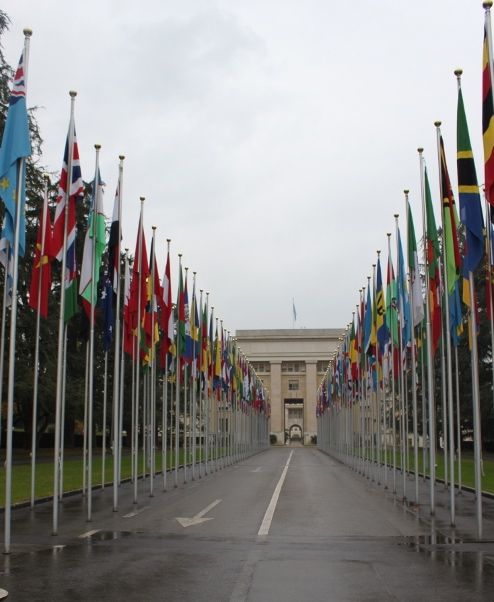WSO deltok med innlegg når CRPD-komiteen holdt en digital konsultasjon om de institusjonalisering 25 mai. Vi var med blant 40 organisasjoner som fikk mulighet til å holde et kort innlegg, og hadde også sendt innspill på forhånd.
Hege Orefellen hadde tre minutter, og vi holdt fokus på opphør av tvangspsykiatri.
Fra Norge deltok også Vibeke Marøy Melstrøm, generalsekretær i Uloba, med innlegg. Hun avsluttet med ordene «We are building new institutions in Norway and, pardon my language, it’s the same shit in new wrapping. Free our people!»
Statement by We Shall Overcome (WSO), Norway for the UN CRPD online regional consultation on deinstitutionalization 25 May 2021
We have persistently voiced the demand for abolition of forced mental health interventions, and for these gross and systemic human rights violations to be remedied and redressed.
We would like to express our deepest concern that within the Council of Europe, there is still an ongoing process to develop a legally binding instrument, the Additional Protocol to the Oviedo Convention, that runs counter to the CRPD by authorizing involuntary treatment and placement in psychiatry. The protocol reinforces discrimination, segregation and coercion, and represents a massive threat to deinstitutionalization and ending forced psychiatric practices in Europe. The call for withdrawal of the protocol must continue.
We urge the Committee to include in the draft guidelines on deinstitutionalization:
- A reiterating call for absolute prohibition of forced treatment and commitment, with a repeal of all legal provisions that authorize any forced or non-consensual interventions or treatments in the mental health system.
- Development of laws and policies that replaces coercive regimes and ensure that all services are based on the free and informed consent of the person concerned, including in emergency situations.
- Securing victims of forced psychiatry access to effective remedies and redress, including effective mechanisms to obtain immediate release from any confinement or forced intervention in mental health settings, and reaffirm States parties’ obligation to ensure such immediate release.[1]
- Establishing a public authority to provide for access to housing, economic and social support in order to facilitate deinstitutionalization and the right to live independently and be included in the community. Such assistance programmes should not be centred on the provision of mental health services or treatment, but affordable community-based services, including alternatives that are free from medical diagnosis and interventions.[2], [3]
- Providing victims of forced psychiatry with compensation, as well as other forms of reparations, in accordance with the UN Basic Principles and Guidelines on the Right to a Remedy and Reparation for Victims of Gross Violation of International Human Rights Law. [4] Since coercive mental health practices represent patterns of violence against persons with disabilities, reparation is needed on a collective, as well as an individual level.[5]
Fotnoter
[1] CRPD, GC 5 on Art 19, para 48.
[2] CRPD, Guidelines on Article 14, para 24.
[3] UN Basic Principles and Guidelines on remedies and procedures on the right to anyone deprived of their liberty to bring proceedings before a court, UN Working Group on Arbitrary Detention, A/HRC/30/37, para 126e (text as adopted with footnotes WGAD/CRP.1/2015).
[4] Basic Principles and Guidelines on the Right to a Remedy and Reparation for Victims of Gross Violation of International Human Rights Law adopted by the General Assembly in resolution 60/147 (2005).
[5] Compensation; Rehabilitation; Restitution to re-establish the victim’s situation before the violation was committed, including restoration of liberty and freedom from forced treatment, enjoyment of family life and citizenship, return to one’s place of residence, and restoration of employment; Satisfaction, including restoring the rights of the victim; sanctions against persons liable for the violations; investigation and criminal prosecution, disclosure of truth, public apologies, acknowledgement of the facts and acceptance of responsibility; Guaranteesof non-repetition, including taking measures to combat impunity, reviewing and reforming laws contributing to or allowing the violations, and secure protection of the law against future acts.
Hva er institusjonalisering og hvorfor denne konsultasjonen
Informasjonen under er hentet fra Informative note for stake-holders på CRPD-komiteens nettsider:
1. What is the Committee on the Rights of Persons with Disabilities?
The Committee is a treaty body of the United Nations. It is established by the Convention on the Rights of Persons with Disabilities. Its task is to monitor how States parties to the Convention implement or give effect to their obligations under this legal instrument. It is comprised of 18 independent experts from all continents of the world, who are elected by the States Parties.
2. What is institutionalization?
For many years, many persons with disabilities have had no choice and control over their lives. People thought persons with disabilities were not able to live independently in a place they choose. They thought that persons with disabilities needed medical treatment in organizations or institutions to correct or cure diseases and physical or intellectual impairments. So countries spent money on special services, isolated from the community, instead of providing support to live in the community. To this day, many persons with disabilities have no choice but to live in institutions, special schools, hospitals, group homes, mental health or psychiatric facilities, residential care facilities, prisons, etc. Many have to live in the family home, or are not allowed to leave the family home even though they are adults and want to live independently. They depend on other persons and have little freedom.
The Convention states that every person with a disability has the right to live independently and be included in the community. All persons with disabilities have this right, whoever they are and wherever they live. It guarantees them freedom, choice and control over the decisions that affect their lives. This right protects the inherent dignity, autonomy and independence of persons with disabilities and secures their full and effective participation and inclusion in society. The Committee wrote a document called General Comment to explain what independent living and being included in the community means. The Committee said: «Social exclusion also engenders stigma, segregation and discrimination, which can lead to violence, exploitation and abuse in addition to negative stereotypes that feed into a cycle of marginalization of persons with disabilities.»
3. What is a consultation?
A consultation is a way for persons to share their experiences and ideas on a topic. The topic of this consultation is the right to independent living and being included in the community, recognised in article 19 of the Convention on the Rights of Persons with Disabilities.

